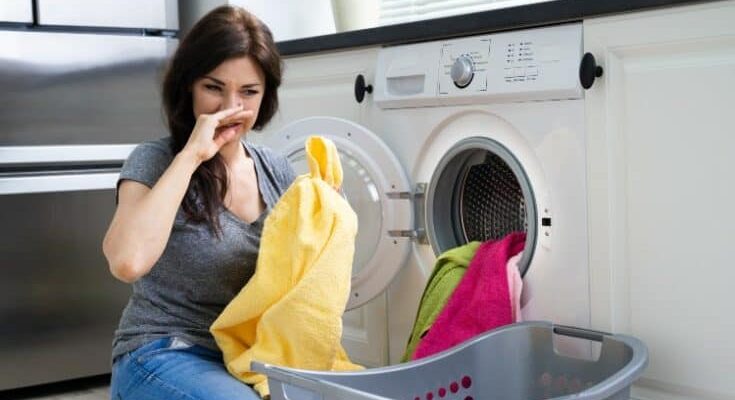Many people have experienced the frustration of finding clothes that smell like a wet dog after they’ve been dried. This problem, which is more than a minor inconvenience can indicate underlying problems with our laundry process.
It is important to understand and address this phenomenon, not just for our noses, but also to ensure the longevity and cleanliness of our clothes. This article explores the causes of a peculiar smell and offers solutions to a cleaner, fresher laundry experience.
Understanding the Problem
Many people are confused by the ‘wet-dog’ smell that clothes emit after drying. This is a common complaint when people expect fresh laundry and instead get a damp, musty smell. It is a particularly puzzling phenomenon because it occurs even when high-quality fabric softeners and detergents are used.
This problem is not limited to a specific dryer type. It can occur in a variety of situations, regardless of whether it’s an older or newest model. This persistent smell can make you uncomfortable in your clothes and may raise questions about your washing process.
Causes of the Wet Dog Smell
Moisture in the Dryer’s Components: This is a primary cause of the smell. It’s moisture that’s trapped in the dryer filter or lint catch. Moisture trapped in these areas encourages mold and mildew growth, which produces a musty smell. To prevent this problem, it is important to clean the lint filter and trap regularly. After every load, it’s important to clean and remove the lint filter and look for any extra moisture or residue in the drum.
Detergent Buildup in the Washing Machine: Sometimes the problem is in the washer rather than in the dryer. When clothes are heated in the dryer, a residue left by excessive or improperly rinsed soap can develop. This problem is more common with washing machines that do not have a front-loading feature, where the rinse cycle may be less efficient. This problem can be mitigated by ensuring that the correct amount of detergent and the washing machine are working correctly.
Residue from Fabric Softeners and Detergents: The smell can be caused by residues left behind from fabric softeners or detergents. These residues may react with the heat from the dryer and cause the smell of a wet dog. It can be helpful to reduce the use of these products, and choose milder, natural alternatives.
Mold and Mildew Growth: The moist, warm environment created by a dryer makes it ideal for mildew and mold growth. It can occur when clothes are not dried properly or if they remain damp for too much time. This growth can be prevented by cleaning the dryer regularly and maintaining a dry atmosphere inside.
Overuse of Detergents: Using too much detergent can lead to a buildup that causes mildew and odor. It is beneficial to follow the recommended detergent quantities and choose high-efficiency machines.
Preventive Measures
Start by cleaning and maintaining your dryer and washing machine regularly. Check the drum of your dryer periodically for lint and debris. Clean the lint filter in your dryer after each use. Use the right amount of detergent in the washing machine and run regular cleaning cycles to get rid of any residue from fabric softener or detergent.
It is important to use fabric softeners and detergents correctly. The residue that can build up in your laundry from these products when you overload it with them will contribute to the smell. Measure these products according the the instructions of the manufacturer and the size the load. Consider using fragrance-free, mild detergents, particularly if your skin is sensitive or you suffer from allergies.
In order to prevent mold and mildew from growing on your appliances, you need to control moisture and ensure that the area is well ventilated. Make sure your laundry room is well ventilated and open the doors to your dryer and washer after each use. Also, do not leave wet clothes in your washer or dryer for long periods.
Last but not least, you should consider the temperature of water during washing. Using warmer water can help dissolve detergent more effectively, reducing residue buildup. Check the garment label for recommended temperatures to avoid damaging your clothing.
Solution and Remedies
You can use several different remedies if your clothes have an unpleasant smell. Vinegar can be an effective natural solution. Pour a cup white vinegar into your washing machine and run an extra cycle. Vinegar contains acetic acids that help to eliminate odors and break down residues.
Baking soda can also be used to neutralize odors. Baking soda can neutralize and absorb unpleasant smells. Add half a teaspoon to your wash cycle. Consider using a laundry odor eliminator if the smell is persistent. These products are specially formulated to combat tough odors, and are usually added to the washing cycle.
It’s also important to find the source of the smell. Washing machine and dryer should be thoroughly cleaned, paying special attention to areas that tend to accumulate moisture. Use a washing machine cleaner or vinegar and baking soda to clean the washing machine. To clean the dryer’s lint filter, use a damp cloth to wipe the drum interior. These appliances can be kept in good condition by performing regular maintenance and cleaning.
Case studies and testimonials
Many users have described their experiences of the smell of wet dog in their clothing. One user explained how regular cleanings of the lint filter and less detergent solved the problem. One person cited the use of baking soda and vinegar to eliminate the smell from their laundry.
The conclusion of the article is:
The persistent problem of clothing smelling like wet dogs after drying is usually a sign of deeper problems with our laundry routine. Understanding the causes of this problem, including moisture retention, detergent buildup, and mold, and taking preventative measures can help us to effectively combat it. To ensure fresh, odorless clothes, regular appliance maintenance, the proper use of detergents, and natural deodorizers such as vinegar and baking soda, are essential. In the end, solving this problem will improve our clothes’ longevity and hygiene, making for a better laundry experience.













Comments